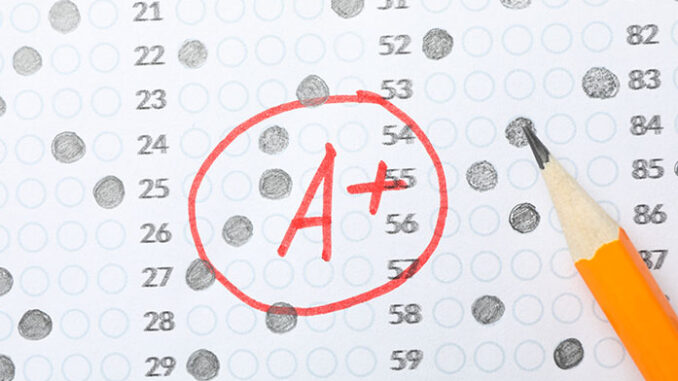
When children come home with a report card with an A or B, you understand that they have mastered all or most of what was expected. If they bring home a C, you know there’s room for improvement. And if they come with a D or F, you know there’s still a great deal of work to do be done to get them where they need to be.
The same is true for grading schools on an A-F accountability scale: the public can understand that A and B schools are doing well, C schools have room for improvement and D and F schools need more support– they have multiple areas that require supports and intervention.
Every year for nearly a decade, Arizona education officials have released an achievement profile for each public school in the state using an A-F grading scale.
The system doesn’t just help schools know where they need to improve; it provides much-needed transparency for parents who are making decisions about where to send their children.
Unfortunately, Arizona currently is facing the temptation to eliminate A-F school accountability because a handful of lawmakers believe the current system doesn’t accurately reflect the quality of our public schools.
It’s true that almost three-fourths of Arizona schools are earning an A or B grade, and that merits a serious conversation about what those letter grades mean and whether we are holding schools to high enough expectations.
It does not mean we should throw out the entire accountability system, leaving parents and stakeholders in the dark about how schools in their communities are doing. The solution isn’t getting rid of measurement; it’s raising the bar for our schools.
A-F grades must measure whether the education system is producing strong student outcomes of proficiency, growth, graduation rate and college and career readiness. These outcomes will improve when educators receive the support and resources to effectively teach the state’s rigorous academic standards, monitor student progress and provide students with educational opportunity.
When all those pieces work together, schools improve, teachers get the support they need, and we see better results for our students. It’s worked in other states, and it will work here.
For example, more than a decade ago, Mississippi was in the middle of an education crisis leading the Governor to initiate an A-F school accountability system with aspirational, yet attainable expectations for performance. In 2011, Mississippi ranked 50th and 49th on the National Assessment of Educational Progress (NAEP) in math at grade 4 and 8 respectively. Mississippi’s NAEP reading rankings were 47th and 50th at grades 4 and 8, respectively. By 2022, Mississippi was hovering around the national average.
Mississippi’s literacy crisis was tackled first. In 2011, almost four out of five fourth graders scored below proficient on the National Assessment of Educational Progress, or NAEP.
Two years later, the state confronted those low reading rates with legislation based on a first-in-the-nation reading law in Florida that ended social promotion in 2002, paving the way for a suite of literacy policies that address and support student needs and empower educators and families for success.
As a result of its focus on early literacy, Florida now ranks third in the nation, and Mississippi has moved from 49th to 21st in fourth grade reading since 2013.
The good news for Arizona is we’re on the right course, with strong early literacy policies such as a science of reading requirement passed in recent years to ensure teachers are properly trained and equipped with the latest strategies on how students learn to read to then read to learn. We just need to make sure we stay on course when it comes to measuring progress.
That means preserving A-F school grading and ensuring it reflects how our schools are performing instead of throwing out the system altogether.
We can’t know what we don’t measure, and if without high expectations for our students, we’ll be copying what states like Oregon, New York and New Jersey have recently done to lower the bar when it comes to standards and testing.
Dismantling the A-F system does a disservice to Arizona’s future.
By instituting high expectations, clear accountability, and continuous improvement efforts, we can ensure all students receive a quality education and graduate equipped to thrive in a competitive world. Now is the time to recommit to our students’ success by building upon the foundation of accountability we have established, not abandoning it.
